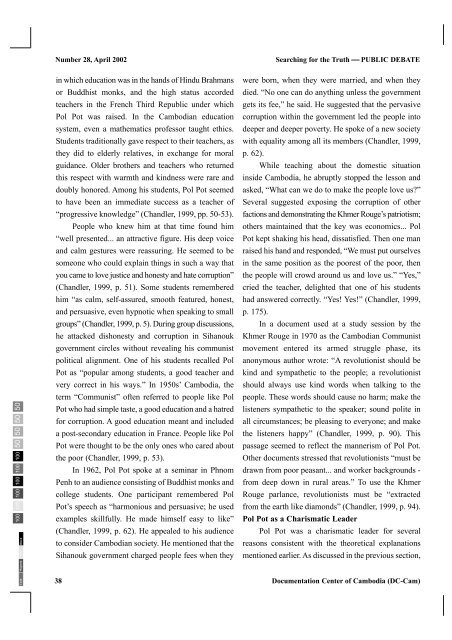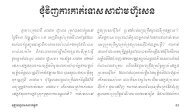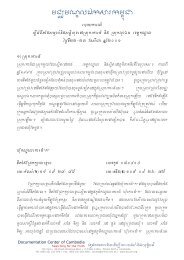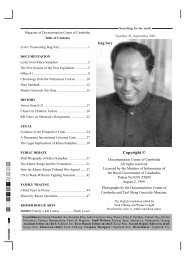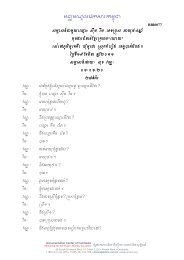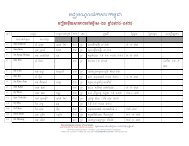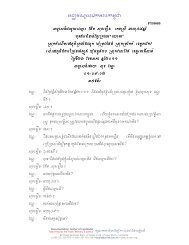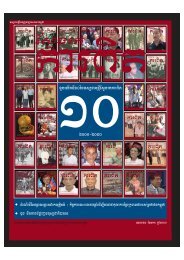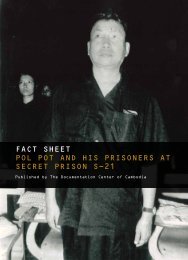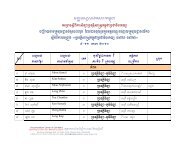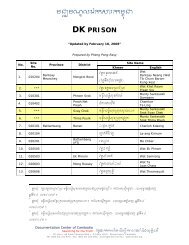Searching for the truth Issues 28 - Documentation Center of Cambodia
Searching for the truth Issues 28 - Documentation Center of Cambodia
Searching for the truth Issues 28 - Documentation Center of Cambodia
You also want an ePaper? Increase the reach of your titles
YUMPU automatically turns print PDFs into web optimized ePapers that Google loves.
100 100 100 100 100 100 50 50 50 50<br />
Black<br />
Yellow<br />
Magenta<br />
Cyan<br />
Number <strong>28</strong>, April 2002<br />
in which education was in <strong>the</strong> hands <strong>of</strong> Hindu Brahmans<br />
or Buddhist monks, and <strong>the</strong> high status accorded<br />
teachers in <strong>the</strong> French Third Republic under which<br />
Pol Pot was raised. In <strong>the</strong> <strong>Cambodia</strong>n education<br />
system, even a ma<strong>the</strong>matics pr<strong>of</strong>essor taught ethics.<br />
Students traditionally gave respect to <strong>the</strong>ir teachers, as<br />
<strong>the</strong>y did to elderly relatives, in exchange <strong>for</strong> moral<br />
guidance. Older bro<strong>the</strong>rs and teachers who returned<br />
this respect with warmth and kindness were rare and<br />
doubly honored. Among his students, Pol Pot seemed<br />
to have been an immediate success as a teacher <strong>of</strong><br />
“progressive knowledge” (Chandler, 1999, pp. 50-53).<br />
People who knew him at that time found him<br />
“well presented... an attractive figure. His deep voice<br />
and calm gestures were reassuring. He seemed to be<br />
someone who could explain things in such a way that<br />
you came to love justice and honesty and hate corruption”<br />
(Chandler, 1999, p. 51). Some students remembered<br />
him “as calm, self-assured, smooth featured, honest,<br />
and persuasive, even hypnotic when speaking to small<br />
groups” (Chandler, 1999, p. 5). During group discussions,<br />
he attacked dishonesty and corruption in Sihanouk<br />
government circles without revealing his communist<br />
political alignment. One <strong>of</strong> his students recalled Pol<br />
Pot as “popular among students, a good teacher and<br />
very correct in his ways.” In 1950s’ <strong>Cambodia</strong>, <strong>the</strong><br />
term “Communist” <strong>of</strong>ten referred to people like Pol<br />
Pot who had simple taste, a good education and a hatred<br />
<strong>for</strong> corruption. A good education meant and included<br />
a post-secondary education in France. People like Pol<br />
Pot were thought to be <strong>the</strong> only ones who cared about<br />
<strong>the</strong> poor (Chandler, 1999, p. 53).<br />
In 1962, Pol Pot spoke at a seminar in Phnom<br />
Penh to an audience consisting <strong>of</strong> Buddhist monks and<br />
college students. One participant remembered Pol<br />
Pot’s speech as “harmonious and persuasive; he used<br />
examples skillfully. He made himself easy to like”<br />
(Chandler, 1999, p. 62). He appealed to his audience<br />
to consider <strong>Cambodia</strong>n society. He mentioned that <strong>the</strong><br />
Sihanouk government charged people fees when <strong>the</strong>y<br />
38<br />
<strong>Searching</strong> <strong>for</strong> <strong>the</strong> Truth ⎯ PUBLIC DEBATE<br />
were born, when <strong>the</strong>y were married, and when <strong>the</strong>y<br />
died. “No one can do anything unless <strong>the</strong> government<br />
gets its fee,” he said. He suggested that <strong>the</strong> pervasive<br />
corruption within <strong>the</strong> government led <strong>the</strong> people into<br />
deeper and deeper poverty. He spoke <strong>of</strong> a new society<br />
with equality among all its members (Chandler, 1999,<br />
p. 62).<br />
While teaching about <strong>the</strong> domestic situation<br />
inside <strong>Cambodia</strong>, he abruptly stopped <strong>the</strong> lesson and<br />
asked, “What can we do to make <strong>the</strong> people love us?”<br />
Several suggested exposing <strong>the</strong> corruption <strong>of</strong> o<strong>the</strong>r<br />
factions and demonstrating <strong>the</strong> Khmer Rouge’s patriotism;<br />
o<strong>the</strong>rs maintained that <strong>the</strong> key was economics... Pol<br />
Pot kept shaking his head, dissatisfied. Then one man<br />
raised his hand and responded, “We must put ourselves<br />
in <strong>the</strong> same position as <strong>the</strong> poorest <strong>of</strong> <strong>the</strong> poor, <strong>the</strong>n<br />
<strong>the</strong> people will crowd around us and love us.” “Yes,”<br />
cried <strong>the</strong> teacher, delighted that one <strong>of</strong> his students<br />
had answered correctly. “Yes! Yes!” (Chandler, 1999,<br />
p. 175).<br />
In a document used at a study session by <strong>the</strong><br />
Khmer Rouge in 1970 as <strong>the</strong> <strong>Cambodia</strong>n Communist<br />
movement entered its armed struggle phase, its<br />
anonymous author wrote: “A revolutionist should be<br />
kind and sympa<strong>the</strong>tic to <strong>the</strong> people; a revolutionist<br />
should always use kind words when talking to <strong>the</strong><br />
people. These words should cause no harm; make <strong>the</strong><br />
listeners sympa<strong>the</strong>tic to <strong>the</strong> speaker; sound polite in<br />
all circumstances; be pleasing to everyone; and make<br />
<strong>the</strong> listeners happy” (Chandler, 1999, p. 90). This<br />
passage seemed to reflect <strong>the</strong> mannerism <strong>of</strong> Pol Pot.<br />
O<strong>the</strong>r documents stressed that revolutionists “must be<br />
drawn from poor peasant... and worker backgrounds -<br />
from deep down in rural areas.” To use <strong>the</strong> Khmer<br />
Rouge parlance, revolutionists must be “extracted<br />
from <strong>the</strong> earth like diamonds” (Chandler, 1999, p. 94).<br />
Pol Pot as a Charismatic Leader<br />
Pol Pot was a charismatic leader <strong>for</strong> several<br />
reasons consistent with <strong>the</strong> <strong>the</strong>oretical explanations<br />
mentioned earlier. As discussed in <strong>the</strong> previous section,<br />
<strong>Documentation</strong> <strong>Center</strong> <strong>of</strong> <strong>Cambodia</strong> (DC-Cam)


